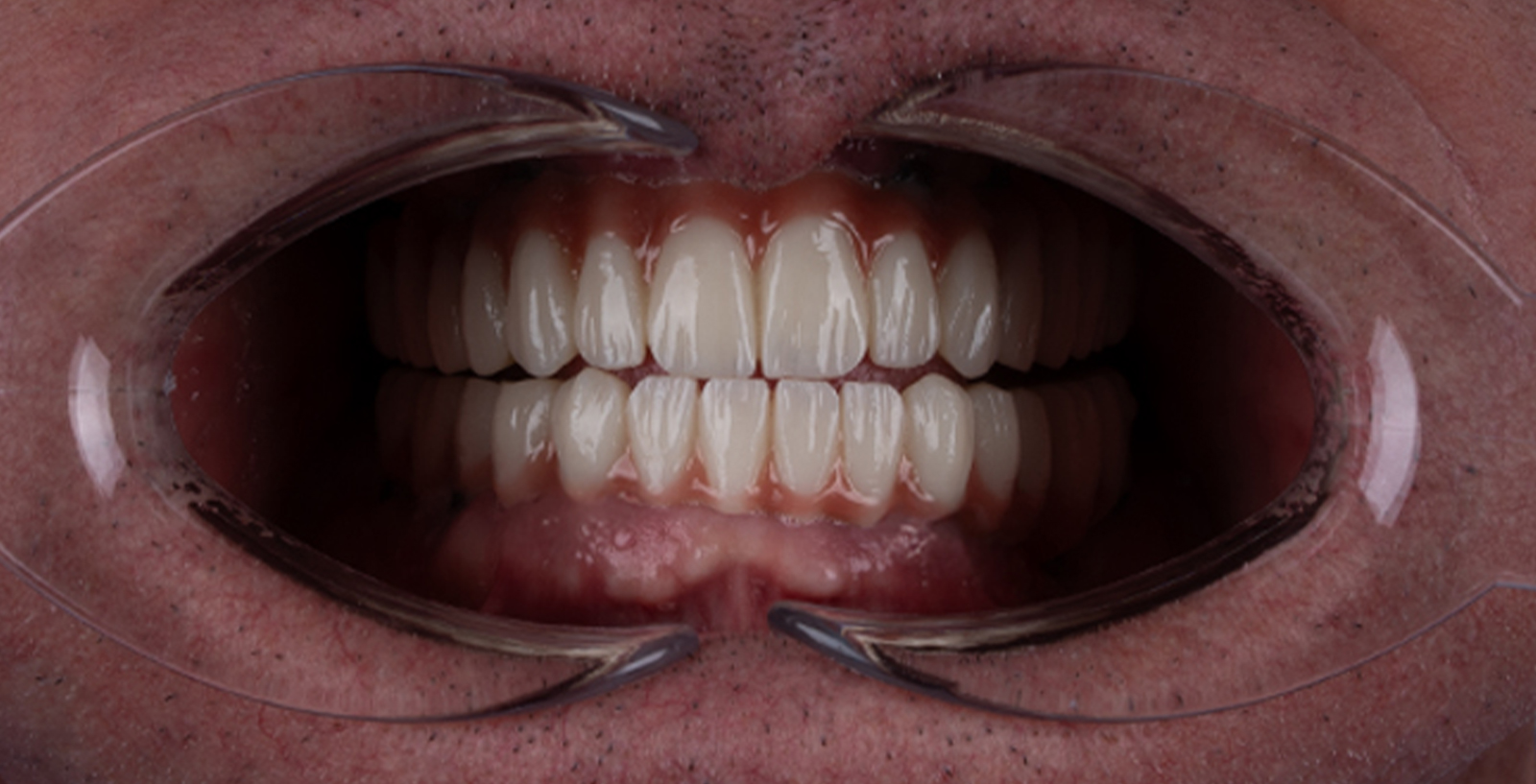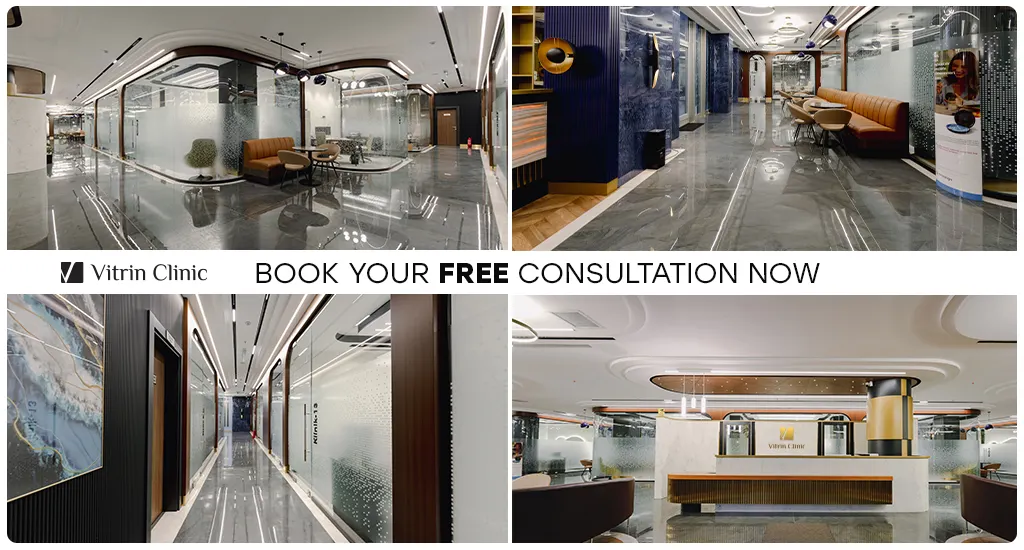At Vitrin Clinic, we understand that dental implants aren’t the right solution for everyone. Whether due to cost, medical reasons, or personal preference, many patients seek other ways to restore their smile.
Fortunately, modern dentistry offers a variety of effective and affordable alternatives to teeth implant alternatives no medical surgery required.
In this article, our expert dentists break down the suitable dental implant alternatives for replacing missing teeth, including fixed dental bridges, partial and full dentures, mini-implants, and more, and which option may be right for your unique needs
Why Consider Alternatives to Dental Implants?

Dental implants are a popular and long-lasting solution for missing teeth but they’re not suitable for everyone. Factors like cost, treatment time, health conditions, and jawbone density can make alternatives more practical.
Cost: Implants are often the most expensive option. Dentures and bridges are usually more budget-friendly.
-
- Treatment Time: Implants require months of healing. Alternatives offer faster results.
-
- Health Concerns: Conditions like diabetes or osteoporosis can complicate implant success.
-
- Bone Loss: Implants need strong jawbone support. Alternatives work even with bone loss.
-
- Surgery: Not everyone wants or can undergo surgery. Bridges and dentures are non-invasive.
-
- Maintenance: Implants last longer, but alternatives are easier to repair or replace.
-
- Personal Preference: Some prioritize convenience or affordability over a surgical solution.
Dental Implant Alternatives
Dental implants are a popular and effective option for replacing missing teeth, but they aren’t suitable for everyone due to cost, health issues, or a desire to avoid surgery.
Fortunately, there are several fixed and non-surgical alternatives available that can restore both function and appearance, offering reliable solutions for those seeking either temporary or long-term tooth replacement without implants.
1. Dental Bridges
Best for: Replacing one or several consecutive missing teeth with support from adjacent healthy teeth.
Dental bridges are fixed restorations that use neighboring teeth as anchors (abutments) to support one or more artificial teeth (pontics).
The most common type, the traditional bridge, involves placing crowns over the abutment teeth with a pontic suspended between them. Variants include:
-
- Traditional Bridges: Anchored by crowns on both sides.
-
- Cantilever Bridges: Supported by a single abutment when only one adjacent tooth is available.
-
- Resin-Bonded (Maryland) Bridges: Minimal preparation bridges bonded with metal or ceramic wings.
Advantages:
-
- Permanently fixed; more stable than removable prostheses.
-
- Blends well with natural teeth for a seamless look.
-
- Efficiently restores chewing and speaking abilities.
-
- Less invasive and more cost-effective than implants.
Limitations:
-
- Requires grinding down healthy adjacent teeth.
-
- Increased stress on abutment teeth may shorten their lifespan.
-
- Doesn’t prevent bone loss at the missing tooth site.
-
- May need replacement every 10–15 years.
2. Implant-Supported Bridges
Best for: Patients missing multiple teeth in a row, seeking a fixed solution with enhanced support.
Though technically involving implants, this option minimizes the number of implants needed. Instead of placing an implant for each missing tooth, a few strategically placed implants support a fixed bridge.
Advantages:
-
- Offers superior stability and function.
-
- No alteration of natural adjacent teeth required.
-
- Prevents jawbone deterioration through osseointegration.
-
- Long-lasting with proper care.
Limitations:
-
- Involves surgery, with associated healing time and risks.
-
- Higher upfront cost than traditional bridges.
-
- Extended treatment timeline (can span several months).
Suitability: Ideal for patients healthy enough for minor surgery and missing several adjacent teeth.
3. Resin-Bonded Bridges (Maryland Bridges)
Best for: Replacing a single missing front tooth, especially in younger patients or as a temporary solution.
These bridges use a metal or ceramic framework bonded to the backside of adjacent teeth, preserving most of the natural tooth structure.
Advantages:
-
- Conservative approach minimal to no tooth reduction.
-
- Quicker and less invasive than traditional bridges or implants.
-
- Affordable and ideal for transitional or cosmetic needs.
Limitations:
-
- Less durable, especially in areas with strong bite force.
-
- May debond over time, requiring rebonding or replacement.
-
- Aesthetic limitations due to visibility of framework.
4. Removable Dentures
Best for: Replacing multiple or all missing teeth on an arch, especially when budget or medical conditions restrict implant use.
Dentures are custom-made removable prostheses that rest on the gums. They can be full (complete) or partial depending on the number of missing teeth.
Types:
-
- Complete Dentures: For full arch tooth loss.
-
- Partial Dentures: For multiple missing teeth with some remaining natural teeth.
Advantages:
-
- Economical compared to fixed options.
-
- Non-invasive; no surgery required.
-
- Restores aesthetics and basic oral function.
-
- Easily adjusted or replaced.
Limitations:
-
- Less stable than fixed solutions; risk of movement or slippage.
-
- Require daily removal and cleaning.
-
- May feel bulky or uncomfortable initially.
-
- Do not prevent jawbone loss over time.
5. Flipper Tooth (Removable Acrylic Partial Denture)
Best for: Temporary replacement of one or a few missing teeth, especially in the front.
A flipper is a lightweight, removable prosthetic used as an interim solution while waiting for a permanent treatment like a bridge or implant.
Advantages:
-
- Immediate tooth replacement, especially after extraction.
-
- Inexpensive and easy to fabricate.
-
- No prep of surrounding teeth required.
Limitations:
-
- Not designed for chewing or long-term wear.
-
- Can feel bulky and less secure.
-
- Easily breakable and prone to wear.
Ideal use: As a short-term cosmetic fix or healing-phase option.
6. Root Canal Therapy (RCT)
Best for: Saving severely decayed or infected teeth that are at risk of extraction.
Although not a direct replacement option, root canal therapy can eliminate the need for extraction thus avoiding the need for a replacement altogether.
Advantages:
-
- Preserves your natural tooth structure.
-
- Less invasive and less costly than extraction + implant.
-
- Maintains normal bite function and alignment.
Limitations:
-
- Treated teeth may weaken and require a crown.
-
- May require retreatment in the future.
-
- Not viable if the tooth is fractured beyond repair.
Suitability: Optimal for teeth that can be structurally restored, with no advanced bone loss or deep fractures.
7. Gum Disease Treatment (Preventive Alternative)
Best for: Preventing tooth loss due to periodontal disease.
Addressing gum disease early can halt or slow the progression of bone and tooth loss. Treatments may include deep cleaning (scaling and root planing), laser therapy, or regenerative procedures.
Advantages:
-
- Helps preserve natural teeth and underlying bone.
-
- Prevents the need for prosthetic replacements.
-
- Improves overall oral and systemic health.
Limitations:
-
- Does not replace missing teeth already lost.
-
- Requires long-term maintenance and oral hygiene.
Cost Comparison: Bridges, Dentures, and Implants
| Tooth Replacement Option | Approx. Cost (USD) | Pros | Cons |
| Dental Bridges | $500 – $1,200 | Fixed, natural feel | Requires adjacent tooth prep |
| Full Dentures | $500 – $1,500 | Affordable, non-invasive | May affect comfort/speech |
| Partial Dentures | $300 – $1,000 | Replace several teeth | Less stable, may loosen |
| Flexible Dentures | $600 – $1,200 | Aesthetic, comfortable | Less durable |
| Flipper Denture | $300 – $500 | Quick, budget-friendly | Temporary solution |
| Dental Implants | $300–$950 | Permanent, most natural | Surgery required, costly |
Know More: Hollywood smile cost guide
Which Dental Implant Alternative Is Right for You?
The best solution depends on several factors:
-
- Number of missing teeth
-
- Budget
-
- Oral health condition
-
- Preference for removable vs. fixed options
A professional dental consultation can help identify the best fit for your needs.
Pros and Cons of Each Tooth Replacement Option
| Option | Pros | Cons |
| Bridges | Fixed, long-lasting | Needs support from healthy teeth |
| Full Dentures | Affordable, easy to clean | Can feel bulky or uncomfortable |
| Partial Dentures | Quick fix, less expensive | Can slip if not properly fitted |
| Flexible Dentures | Comfortable, metal-free | May not last as long |
| Flippers | Easy to make and wear | Not a permanent solution |
When Should You Choose a Dental Implant Instead?
While alternatives are excellent, dental implants remain the gold standard for:
-
- Long-term durability
-
- Bone preservation
-
- Natural chewing function
If you’re healthy and able to undergo oral surgery, a dental implant may still be the right choice for long-term value and performance.
Why Considering Tooth Replacement in Istanbul?
If you’re looking for affordable, high-quality alternatives to dental implants, look no further than Vitrin Dental Clinic in Istanbul.
Specializing in cosmetic and restorative dentistry, Vitrin Dental offers expert care using the latest technology all at a fraction of the cost compared to many Western countries.
Why Choose Vitrin Dental Clinic?
-
- Highly experienced Multi-languages speaking dentists
-
- Personalized treatment plans and digital smile design
-
- Expertise in dentures, bridges, and implant alternatives
-
- Transparent pricing with no hidden fees
-
- Comfortable care for local and international patients
Whether you need full dentures, flexible partials, or advanced non-implant restorations, Vitrin Dental provides treatment that’s both effective and affordable.
Located in the heart of Istanbul, Vitrin Dental Clinic welcomes patients from around the world for quality, compassionate dental care.
Before & After
From fixes to permanent smile implants!









Get a Confident Smile Without Surgery with Vitrin Clinc
Missing teeth can affect more than just your smile; they can impact your confidence and oral health too. Fortunately, dental implants aren’t the only solution.
From flexible dentures to traditional bridges, there’s a wide range of safe, effective, and affordable alternatives available today.

Final Thoughts
While dental implants offer an excellent, long-lasting solution for tooth loss, they are not the only route to restoring oral function and aesthetics.
From traditional bridges and resin-bonded restorations to non-invasive options like dentures and flipper teeth, modern dentistry offers a spectrum of alternatives tailored to your needs, budget, and medical profile.
Choosing the right treatment starts with a detailed consultation and understanding of each option’s benefits and limitations. Talk to your dentist about which implant-free option best suits your dental goals.
FAQS:
What is the best alternative to dental implants?
Dental bridges or dentures are common alternatives, depending on the number of missing teeth.
What can you have instead of a tooth implant?
You can get a dental bridge, partial denture, or even veneers if the tooth isn’t missing.
Can teeth be fixed without implants?
Yes. Veneers, crowns, and bridges can repair or replace teeth without using implants.
Can you replace teeth without implants?
Yes. Dentures and bridges can replace missing teeth without surgery.



